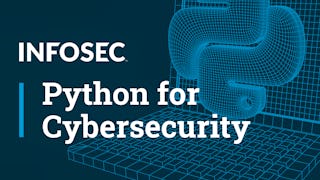Updated in May 2025.
This course now features Coursera Coach! A smarter way to learn with interactive, real-time conversations that help you test your knowledge, challenge assumptions, and deepen your understanding as you progress through the course. This course provides an advanced exploration of exploit development, malware creation, and defensive strategies in ethical hacking. By delving into object-oriented programming, building backdoors, creating malicious payloads, and analyzing network traffic, learners will gain hands-on experience in crafting cybersecurity tools and deploying them for real-world testing. The course also highlights defensive tactics, equipping learners with the skills necessary to protect systems from the very exploits they learn to develop. The course starts with Object-Oriented Programming (OOP) in Python, where students will learn how to define and use classes and methods, implement inheritance, and handle errors. This foundational knowledge is crucial for creating robust scripts for ethical hacking tasks. Next, we cover the creation and manipulation of backdoors, teaching students how to write listener scripts, send commands remotely, and encode communications for stealth. This leads into malware analysis, with lessons on creating and packaging malicious files, configuring them to run on system startup, and using tools like Regedit to modify system configurations. In addition to offensive techniques, the course also explores key defensive strategies like packet listening and Man-in-the-Middle (MITM) attacks. Students will learn how to capture network traffic using Wireshark, create ARP poisoning attacks, and build tools for network scanning and keylogging. The inclusion of real-world case studies and practical projects provides students with a comprehensive understanding of both the attack and defense sides of cybersecurity, preparing them for certifications and advanced roles in penetration testing and ethical hacking. This course is designed for intermediate to advanced learners in cybersecurity, penetration testing, and exploit development. Knowledge of Python programming and networking concepts is beneficial but not required. The content is suitable for professionals aiming to specialize in malware analysis, exploit development, or defensive cybersecurity strategies.




 enthalten
enthalten












